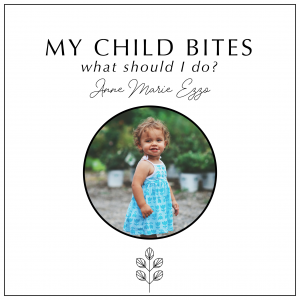It’s the last thing a parent wants to hear: your child has bitten another child. Or maybe it’s an issue Mom is experiencing at home with her son or daughter: she’s frustrated with her child biting her or a sibling. Either way, we know it’s unacceptable. But as parents, we often seem to be at a loss as to what is the best way to deal with this painful problem. We seem to either react too strongly or take it too lightly by not really dealing with it at all.
For starters, it is helpful to gain understanding by examining some basic facts about biting. To begin with, a child biting another person is as much a developmental issue as it is a behavioral issue. This means that, eventually, a child will outgrow biting. However, if the underlying cause of a child using this form of expression is not recognized and dealt with, that same child might then resort to hitting others. Other children who bit when they were younger may actually withdraw from social interactions altogether.
Some of the underlying causes that may result in a child biting include:
- a noisy environment
- inadequate sleep
- an insufficient amount of structure and routine
- a lack of age-appropriate boundaries
Another critical factor that is frequently overlooked in today’s culture is that children often resort to biting because they have been placed in social settings that tend to overwhelm their physical and emotional senses. This can happen when a parent feels pressured to have her child in a variety of play groups or in an environment with too many children – all for the purpose of “socialization”. Some children simply are not developmentally ready to handle the stress that comes from being placed in a large group of their peers. Also, we need to consider the home environment. An only child or a more introverted child may sense an intrusion on his private space or feel emotionally overwhelmed or threatened, and therefore biting becomes the coping mechanism of choice.
So what can parents do to curb or eliminate this behavior? One thing is for certain: sitting down and reasoning with a toddler will not work. We recommend that at the first sign of biting, review the list above and determine if one or more of those factors is a contributor. It is amazing what additional structure, routine, rest, and boundaries can do to help eliminate the problem.
Second, for a few months, it might be wise to limit outside activities that involve large groups of children such as birthday parties, public nursery settings, or story hour at the library. You certainly don’t want to eliminate all contact with other children his age, but instead should control the environment by placing him in smaller, well-supervised group settings.
While the immediate consequence for biting is lovingly yet firmly expressing displeasure with your child’s behavior and removing him from other children, the underlying problem still needs to be addressed. The long-term solution is to manage his environment, while working to provide him with some tools so that he can manage himself. If your child is verbal, teach him or her to verbalize his emotions by saying things such as, “I am almost finished playing with this toy and then I will share it.” You can still instruct the pre-verbal child how to handle stressful situations by role-playing. Teach him to come to you for help and sign or say the simple phrase “help please”. The child’s world must be reduced socially for a short period of time until he is old enough to gain the coping skills needed to handle the stress large groups of children tend to create in his little world. Manage his world and you will help him manage his behavior.
For a visual teaching dealing with biting, visit www.growingfamilies.life and view Toddlers and Biting (TTV9-03S) or click on this link: https://growingfamilies.life/toddlerhood-transiton-blog/2018/5/31/ttv9-03s-toddlers-and-biting





Leave a Reply